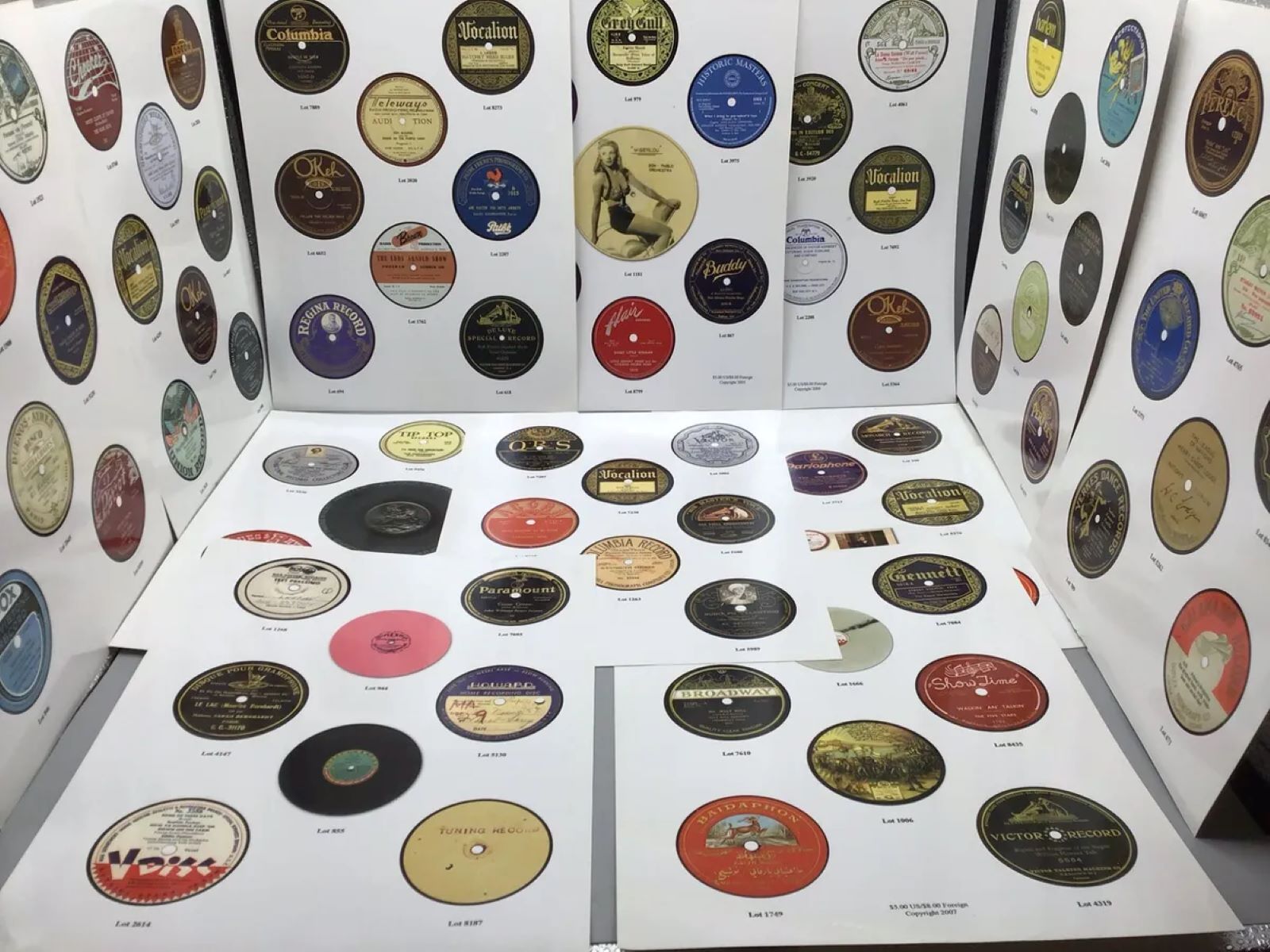Home>Production & Technology>Record Label>What Is An Independent Record Label


Record Label
What Is An Independent Record Label
Published: January 25, 2024
A comprehensive guide to understanding what an independent record label is and the role it plays in the music industry. Discover the benefits and challenges of starting your own record label.
(Many of the links in this article redirect to a specific reviewed product. Your purchase of these products through affiliate links helps to generate commission for AudioLover.com, at no extra cost. Learn more)
Table of Contents
- Introduction
- Definition of an Independent Record Label
- History of Independent Record Labels
- Characteristics of Independent Record Labels
- Advantages of Being Signed to an Independent Record Label
- Challenges Faced by Independent Record Labels
- How Independent Record Labels Differ from Major Labels
- Successful Independent Record Labels and Their Artists
- The Role of Independent Record Labels in the Music Industry
- Conclusion
Introduction
In the ever-evolving world of the music industry, record labels play a crucial role in discovering, nurturing, and promoting talented artists. While major record labels often dominate the mainstream music scene, there is a thriving industry of independent record labels that cater to a diverse range of musical genres and offer a unique platform for artists.
Unlike major record labels, which are typically associated with established artists and have substantial financial resources, independent record labels operate on a smaller scale and prioritize artistic creativity, freedom, and direct artist-label relationships. Independent record labels have become synonymous with innovation, fostering underground talent, and contributing to the overall diversity and vibrancy of the music landscape.
This article aims to provide an in-depth understanding of independent record labels, their history, characteristics, advantages, challenges, and their distinct role within the music industry. Whether you are an aspiring artist, a music enthusiast, or simply curious about the inner workings of the music business, this article will shed light on the fascinating world of independent record labels.
Definition of an Independent Record Label
An independent record label, also known as an indie label, is a music company that operates independently from major record labels. While there is no strict definition of what constitutes an independent record label, they are typically characterized by their autonomy, ability to make creative decisions, and their focus on nurturing emerging artists.
Unlike major record labels, which are part of large conglomerates and have significant financial backing, independent record labels are often started by music enthusiasts or industry professionals who are passionate about supporting and promoting artists they believe in. They are driven by a love for music rather than purely commercial considerations.
Independence is a key aspect of these record labels. It means they have full control over the music they release, the artists they sign, and the creative direction of their label. They are not influenced by external stakeholders or corporate interests, allowing them to prioritize the artistic integrity and vision of their artists.
Independent record labels often have smaller artist rosters than major labels, allowing them to provide more personalized attention and support to their artists. They focus on building long-term relationships with their artists and providing them with the necessary resources, guidance, and promotion to develop their careers.
In recent years, the definition of an independent record label has evolved with the changing landscape of the music industry. With the rise of digital music platforms and DIY (do-it-yourself) culture, artists have greater opportunities to release music independently. Some independent record labels have even embraced this shift by operating as artist-owned cooperatives or platforms that provide distribution and promotional services to independent musicians.
It’s important to note that not all independent record labels are niche or underground. Some independent labels have achieved mainstream success and are home to globally recognized artists across various genres. The defining characteristic of an independent record label lies not in their scale or commercial success but in their commitment to artistic freedom, creativity, and artist development.
History of Independent Record Labels
The history of independent record labels can be traced back to the early days of the music industry, when major labels dominated the market and controlled most aspects of music production and distribution. However, as the industry evolved, independent labels emerged as an alternative to the traditional model, providing a platform for innovative and niche artists.
In the early 20th century, independent record labels began to flourish alongside major labels. These labels catered to specific regional or niche markets, focusing on genres and artists that were often overlooked by the mainstream. They played a crucial role in documenting and promoting regional music styles, such as blues, jazz, and country, which would later become influential in shaping popular music.
One notable independent record label that emerged during this period was Sun Records, founded by Sam Phillips in Memphis, Tennessee, in 1952. Sun Records played a pivotal role in the development of rock and roll by signing and promoting artists like Elvis Presley, Jerry Lee Lewis, and Johnny Cash.
In the 1960s and 1970s, the independent label scene further expanded with the rise of counterculture movements and a shift towards more diverse and experimental music. Labels like Motown and Stax Records emerged, focusing on R&B and soul music, while independent labels like Atlantic and Sub Pop gained prominence by championing alternative and underground genres.
The 1980s and 1990s witnessed a significant growth of independent record labels, fueled by the punk and DIY movements. These labels embraced the ethos of independence, empowering artists to control their own music production, distribution, and promotion. Labels like Dischord Records, SST Records, and Merge Records played a vital role in shaping alternative rock and indie music scenes.
With the advent of the internet and digital music platforms in the late 1990s and early 2000s, independent record labels found new ways to connect with audiences and distribute music. The barriers to entry were lowered, allowing artists to reach a global audience without the need for major label backing. Independent labels like Domino, XL Recordings, and Merge Records successfully navigated the digital landscape and continued to champion innovative artists.
Today, independent record labels continue to thrive, with a diverse array of labels spanning multiple genres and styles. They provide a platform for emerging artists, support creative experimentation, and contribute to the overall diversity and vibrancy of the music industry.
Characteristics of Independent Record Labels
Independent record labels are known for their distinctive characteristics that set them apart from major labels. These characteristics contribute to the unique environment, ethos, and approach of independent labels in the music industry.
1. Autonomy and Creative Control: Independent record labels operate with a high degree of autonomy, allowing them to make creative decisions without external influence. They prioritize artistic integrity and the freedom of their artists, enabling them to explore and experiment with their musical style.
2. Artist-Centric Approach: Independent labels often have a close-knit relationship with their artists, focusing on long-term development and support. They foster a more personal and collaborative environment, providing artists with individualized attention, guidance, and opportunities for growth.
3. Niche and Diverse Music Genres: Independent record labels actively seek out and champion artists in niche and diverse music genres. They embrace a wide range of styles, from alternative rock and electronic music to folk, hip-hop, and world music. This commitment to diversity results in a more vibrant and eclectic music landscape.
4. Limited Size and Resources: Independent record labels are typically smaller in scale compared to major labels, often operating with limited financial resources. However, they make up for this with a passionate and dedicated team that works closely with artists to maximize their potential and opportunities.
5. Grassroots Promotion and Marketing: Independent labels often rely on grassroots promotion and marketing strategies to connect with their audience. They prioritize building strong connections with fans, utilizing social media, live shows, and community engagement to create a dedicated following around their artists.
6. Flexibility and Adaptability: Independent labels are known for their ability to adapt quickly to shifts in the industry. They embrace new technologies and platforms, such as streaming services and digital distribution, to reach audiences worldwide. This adaptability allows them to thrive in a rapidly changing music landscape.
7. Emphasis on Physical Releases: While digital music has become dominant in recent years, many independent labels hold a special appreciation for physical releases. Vinyl records, CDs, and cassettes often play a significant role in the independent label scene, catering to music enthusiasts and collectors.
8. Curators of Musical Taste: Independent labels serve as curators and tastemakers, introducing audiences to new and emerging artists. They have a reputation for discovering talent and nurturing artists from the ground up, often acting as gatekeepers to unique and authentic music.
Collectively, these characteristics shape the identity of independent record labels, positioning them as vital contributors to the music industry, fostering innovation, diversity, and artistic freedom.
Advantages of Being Signed to an Independent Record Label
Being signed to an independent record label presents several advantages for artists looking to establish their careers and maintain creative control over their music. While major labels offer their own benefits, independent labels provide a unique set of advantages that can significantly impact an artist’s trajectory in the music industry.
1. Artistic Freedom and Creative Control: Independent record labels prioritize the artistic vision and integrity of their artists. They allow musicians to maintain full creative control over their music, enabling them to explore their artistic boundaries, experiment with different styles, and develop their unique sound without external interference or pressure to conform to commercial trends.
2. Personalized Support and Guidance: Independent labels often have a smaller roster of artists, which translates to more personalized attention and support. Artists can benefit from one-on-one relationships with label representatives who genuinely care about their growth and development. This individualized support can include guidance on songwriting, production, touring, marketing, and connecting with their target audience.
3. Nurturing Long-Term Careers: Independent labels take a long-term approach when it comes to artist development. Rather than seeking immediate commercial success, they invest in the long-term growth and sustainability of their artists’ careers. Independent labels are more likely to invest time and resources in developing an artist’s skills, fanbase, and overall brand, allowing for steady growth and artistic evolution over time.
4. Flexibility and Creative Experimentation: Independent labels provide an environment that encourages creative experimentation and risk-taking. Artists are given the freedom to explore different genres, collaborate with other musicians, and push boundaries without the fear of commercial expectations. This creative freedom allows for the cultivation of a unique and authentic artistic identity.
5. Collaborative and Transparent Relationships: Independent labels often foster a collaborative relationship between the artists and label executives. Artists have more direct access to decision-makers and the opportunity to contribute their input on various aspects of their career, including album artwork, release schedules, and marketing strategies. These transparent relationships help build trust and ensure that artists have a say in their own trajectory.
6. Greater Attention to Detail and Quality: Independent labels tend to be more discerning in their selection process and prioritize quality over quantity. With their smaller artist roster, they can allocate more time and resources to each release. This attention to detail can result in better production, promotion, and overall presentation of an artist’s work, fostering a positive reputation and perception within the industry.
7. Diverse and Niche Audience Reach: Independent labels often specialize in niche genres and connect with specific fanbases. This focus allows artists to tap into unique markets and build dedicated followings. The label’s expertise in promoting and connecting with these niche audiences increases the chances of artists being embraced and supported by fans who truly appreciate their music.
8. Retention of Ownership and Rights: Independent labels typically offer more favorable deals in terms of ownership and rights. Artists have a higher likelihood of retaining control over their masters, publishing, and future creative endeavors. This can be crucial for an artist’s long-term financial stability and artistic autonomy.
While the advantages offered by independent record labels may vary from label to label, overall, being signed to an independent label can provide artists with the support, freedom, and opportunities necessary to thrive in an ever-evolving music industry.
Challenges Faced by Independent Record Labels
While independent record labels offer numerous advantages to artists, they also face their fair share of challenges. These challenges can arise due to limited resources, fierce competition, and the ever-changing dynamics of the music industry. It’s important to recognize and navigate these obstacles in order to sustain and grow an independent label successfully.
1. Financial Constraints: Independent labels often operate with smaller budgets compared to major labels, making it challenging to allocate funds for artist development, marketing, and promotion. Limited financial resources can limit the label’s ability to compete with larger marketing campaigns, secure high-profile placements, or invest in expensive production and touring expenses.
2. Limited Reach and Distribution: Independent labels may struggle to secure wide-scale distribution deals, limiting the physical and digital availability of their artists’ music. This can hinder the label’s ability to reach a broad audience and compete with the larger reach of major label releases. However, with the rise of digital distribution platforms, independent labels now have greater access to global audiences.
3. Lack of Industry Clout and Influence: Independent labels may face challenges when it comes to accessing key industry gatekeepers, such as radio programmers, playlist curators, and media outlets. Major labels often have longstanding relationships and substantial resources to facilitate the promotion and marketing of their artists, making it more difficult for independent labels to secure these crucial avenues of exposure.
4. Talent Acquisition and Retention: While independent labels often pride themselves on discovering and nurturing emerging talent, they can face challenges in attracting and retaining top-tier artists. Competition from major labels, who can offer larger advances and more significant marketing campaigns, can make it difficult for independent labels to compete for highly sought-after artists.
5. Limited Resources for A&R and Artist Development: Independent labels may have fewer resources for artist and repertoire (A&R) efforts and artist development. With smaller teams and budgets, it can be challenging to provide the necessary support and guidance to artists throughout their careers. This limitation can result in a heavier workload for label staff and potentially hinder the label’s ability to identify and develop promising talent.
6. Risk and Uncertainty: Independent labels operate in a high-risk industry where success is not guaranteed. The financial investment in artists and the uncertainty of audience reception can make it challenging for independent labels to balance financial sustainability with artistic integrity. The label must carefully select and invest in artists while remaining adaptable to industry shifts and changes.
7. Limited Marketing and Promotion Opportunities: Independent labels often have to be creative in their marketing and promotion strategies due to smaller budgets. They may heavily rely on grassroots efforts, social media, word-of-mouth, and touring to build awareness and connect with audiences. While these methods can be effective, it takes time, effort, and consistency to build momentum and reach a wider audience.
8. Industry Perceptions: Independent labels may face skepticism or a lack of recognition within the music industry. Some industry professionals and gatekeepers may overlook independent releases or underestimate the label’s ability to break new talent. However, with the success of independent labels and artists gaining prominence, these perceptions are gradually shifting.
Despite these challenges, independent record labels continue to thrive and contribute to the vibrant musical landscape. By embracing their uniqueness, leveraging their strengths, and staying adaptable, independent labels can overcome these obstacles and make meaningful contributions to the music industry.
How Independent Record Labels Differ from Major Labels
Independent record labels and major labels operate in distinct ways and offer different opportunities for artists. Understanding the differences between them can help artists make informed decisions about their career paths and find the right fit for their artistic goals and aspirations.
1. Ownership and Control:
Independent labels are typically privately owned and operated by individuals or a small team, allowing for more direct artist-label relationships and decision-making processes. Major labels, on the other hand, are often part of larger corporations, which can result in a more bureaucratic structure and limited control for artists.
2. Artist Development and Support:
Independent labels often prioritize long-term artist development and support, taking the time to nurture emerging talent and help artists grow their careers. Major labels may focus more heavily on immediate commercial success and may allocate resources differently, which can result in less personal attention and support for artists.
3. Creativity and Artistic Freedom:
Independent labels tend to offer artists greater artistic freedom and creative control over their music. Artists on independent labels often have more input into the production, marketing, and overall direction of their projects. In contrast, major labels may have more influence over the creative process, often aiming for a broader commercial appeal.
4. Financial Resources:
Major labels generally have more substantial financial resources, allowing them to invest in high-profile marketing campaigns, extensive touring, and high-budget productions. Independent labels often operate with limited budgets and must be more resourceful in their promotional efforts.
5. Genre and Niche Focus:
Independent labels often have a specialization in specific genres or cater to niche markets. They embrace a broader range of musical styles, allowing for more diverse and experimental offerings. Major labels tend to focus on mainstream genres and commercial viability, targeting a wider audience.
6. Distribution and Reach:
Major labels often have stronger distribution networks and established relationships with radio stations, streaming platforms, and retail outlets. Independent labels may have a smaller reach but can leverage digital platforms and online communities to connect with targeted audiences on a more personal level.
7. Contracts and Royalties:
Contracts between major labels and artists tend to be more complex and heavily favor the label. Artists may receive larger advances but have less favorable royalty rates and ownership of their masters. Independent labels often offer more flexible contracts and can negotiate terms that better align with the artists’ interests.
8. Perception and Prestige:
While major labels often carry more industry clout and recognition due to their vast resources and established history, independent labels have gained prominence and respect for their ability to foster unique and innovative talent. Being signed to an independent label can enhance an artist’s reputation among fans who value authenticity and creativity.
Overall, the choice between an independent or major label depends on an artist’s specific goals, artistic vision, and desired level of control. Independent labels provide an alternative space for artists seeking artistic freedom, personalized support, and the opportunity to explore their musical style without compromising their vision.
Successful Independent Record Labels and Their Artists
Independent record labels have been responsible for discovering and nurturing some of the most influential and groundbreaking artists in the music industry. These labels have carved a niche for themselves and have contributed to the vibrancy and diversity of the music landscape. Here are a few examples of successful independent record labels and the artists they have championed:
1. Sub Pop Records:
Sub Pop Records, founded in 1986 in Seattle, played a pivotal role in the emergence of the grunge and alternative rock movements of the 1990s. They were responsible for signing and promoting bands like Nirvana, Soundgarden, and Mudhoney, helping to bring the Seattle music scene to mainstream attention and influencing the direction of rock music for years to come.
2. Warp Records:
Warp Records, established in 1989 in the UK, is renowned for its pioneering electronic and experimental music catalog. They have worked with influential artists such as Aphex Twin, Boards of Canada, and Flying Lotus, pushing the boundaries of electronic music and shaping the genre’s evolution.
3. Merge Records:
Merge Records, founded in 1989 in North Carolina, has been a driving force in the indie rock scene. They have nurtured the careers of artists like Arcade Fire, Neutral Milk Hotel, and Superchunk, establishing a reputation for their keen eye for talent and dedication to artistic integrity.
4. Matador Records:
Matador Records, started in 1989, has a diverse roster of influential artists spanning multiple genres. They have worked with bands like Yo La Tengo, Pavement, and Interpol, consistently releasing innovative and critically acclaimed music that resonates with both indie and mainstream audiences.
5. XL Recordings:
XL Recordings, founded in 1989 in the UK, has gained international recognition for its roster of diverse and boundary-pushing artists. They have successfully released music from artists such as Adele, Radiohead, The Prodigy, and Sigur Rós, showcasing their ability to adapt to different genres while maintaining their independent spirit.
6. Domino Recording Company:
Domino Recording Company, established in 1993, has been at the forefront of indie and alternative music. They have worked with notable artists like Arctic Monkeys, Franz Ferdinand, and Animal Collective, demonstrating a commitment to supporting innovative and unique voices in the music industry.
7. Stones Throw Records:
Stones Throw Records, founded in 1996, has been instrumental in shaping underground hip-hop and beat scenes. They have helped propel the careers of artists such as Madlib, J Dilla, and Homeboy Sandman, recognizing and cultivating talent that stands out from mainstream rap.
These are just a few examples of the many successful independent record labels and artists who have left an indelible mark on the music industry. They demonstrate that independent labels not only have the ability to discover and nurture exceptional talent but also the power to shape trends, challenge conventions, and contribute to the ever-evolving landscape of music.
The Role of Independent Record Labels in the Music Industry
Independent record labels play a vital role in shaping and diversifying the music industry. They are instrumental in discovering and nurturing emerging artists, promoting musical innovation, and providing a platform for creative expression. Here are some key roles that independent record labels fulfill:
1. Discovering and Cultivating Talent:
Independent labels have a unique ability to identify talent that may be overlooked or undervalued by major labels. They actively seek out artists with distinctive sounds, unique perspectives, and innovative approaches to music. By providing support, mentorship, and resources, independent labels help nurture these artists, giving them the opportunity to develop their craft and reach a larger audience.
2. Promoting Musical Diversity and Artistic Freedom:
Independent labels are known for embracing a wide range of musical genres and styles. They provide a platform for artists to explore their artistic vision and experiment with different sounds without the pressure to conform to commercial trends. This commitment to diversity and artistic freedom helps to push the boundaries of music, fostering creativity and creating a more vibrant and inclusive industry.
3. Fostering Local and Regional Scenes:
Independent labels often have strong connections to local music scenes and regional styles. They become a driving force in documenting and promoting unique regional music cultures that may not receive mainstream attention. This support helps to preserve and celebrate local music scenes, contributing to cultural heritage and preserving the rich tapestry of global music.
4. Providing Artist Development and Support:
Independent labels are known for their personalized approach to artist development. They invest time, resources, and expertise in guiding artists throughout their careers, helping them navigate the music industry and make informed decisions. This support can include aspects such as songwriting, production, touring, marketing, and connecting with their fan base, ensuring artists have the tools they need to grow and succeed.
5. Building Strong and Direct Artist-Label Relationships:
Independent record labels foster close-knit relationships with their artists. Artists have direct access to label executives and decision-makers, allowing for open communication and collaboration. This direct relationship helps in maintaining artistic integrity and ensures that artists are actively involved in decisions that impact their careers.
6. Filling Gaps in the Market:
Independent labels often fill gaps left by major labels in terms of genres and target audiences. They cater to niche markets and provide a platform for artists who might not fit the mainstream mold. By offering a supportive and nurturing environment, independent labels create opportunities for artists who may not have otherwise been able to find success within traditional music industry norms.
7. Pushing Against Commercial Constraints:
Independent labels are often free from the pressures of commercial success and corporate interests. This enables them to take risks, support unconventional artists, and release music that may not fit the mainstream mold. They help challenge the status quo, break new ground, and shape trends within the industry.
8. Contributing to Music Innovation:
Independent labels have a reputation for fostering innovation and introducing new sounds and styles. They serve as a breeding ground for experimentation, encouraging artists to push their creative boundaries and explore fresh musical territories. This commitment to innovation contributes to the overall evolution and progression of music as an art form.
In summary, independent record labels play a crucial role in the music industry by discovering and supporting diverse talent, promoting artistic freedom, and contributing to musical innovation. They provide a necessary counterbalance to major labels, helping to create a more dynamic, inclusive, and vibrant music landscape for artists and audiences alike.
Conclusion
Independent record labels are an integral and vibrant part of the music industry. They offer an alternative space for artists to flourish, providing artistic freedom, personalized support, and a nurturing environment. Independent labels play a critical role in discovering and developing emerging talent, fostering musical diversity, and promoting innovation within the industry.
Throughout history, independent record labels have been responsible for introducing groundbreaking artists and genres, challenging conventions, and shaping musical trends. They have been at the forefront of cultural movements, documenting regional music scenes, and pushing the boundaries of artistic expression.
While independent record labels face challenges, such as financial constraints, limited resources, and competition from major labels, they have consistently proven their resilience and ability to adapt to an ever-evolving music industry. They continue to foster an environment that encourages creativity, fosters meaningful artist-label relationships, and cultivates musical talent that may not fit the mainstream mold.
Independent record labels offer advantages for artists, including artistic freedom, personalized support, and the opportunity to explore unique musical styles. They are instrumental in artist development and provide a vital platform for musicians to reach their audience, connect with fans, and build sustainable careers.
Moreover, independent record labels contribute to the overall diversity and vibrancy of the music industry. They support niche genres, regional music scenes, and artists with unique perspectives, ensuring a rich and eclectic musical landscape for audiences. Their influence extends beyond commercial success, often prioritizing artistic integrity and the long-term growth of artists.
In conclusion, independent record labels are a vital force within the music industry. They shape the musical landscape, nurture talent, promote innovation, and provide a platform for artists to express their creativity authentically. Whether an artist seeks artistic freedom, personalized support, or the opportunity to experiment with their sound, independent record labels offer a unique and valuable space for artists to thrive.











